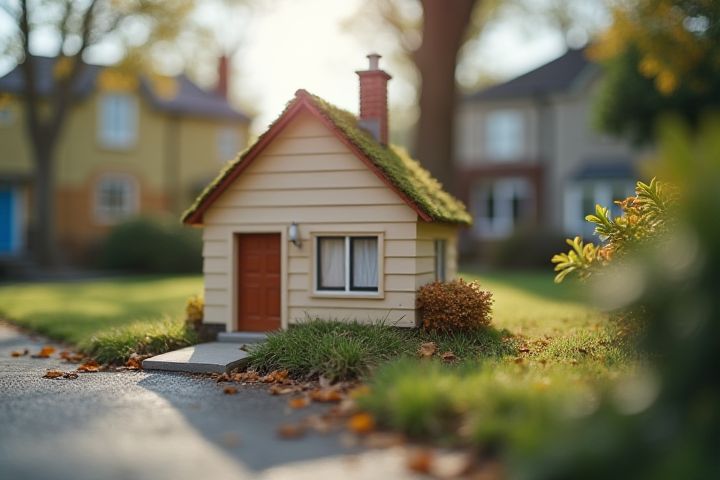
Several factors influence house property value, including location, property condition, and local market trends. Proximity to amenities such as schools, parks, and shopping centers enhances desirability, driving prices up. The age and maintenance of the home significantly impact its appeal; a well-kept property often fetches a higher value. Economic conditions, such as interest rates and employment rates in the area, also play a crucial role in determining market demand. Understanding these variables can help you make informed decisions when buying or selling real estate.
What Affects House Property Value
Location
Location significantly impacts house property value, contributing to approximately 80% of a property's worth. Proximity to essential amenities such as schools, hospitals, and shopping centers can increase desirability, driving up demand and prices. Factors like neighborhood safety, zoning regulations, and even local trends in urban development play crucial roles in shaping property values. For your investment, consider that homes in highly regarded school districts can command premiums of 10-25% over similar properties in less desirable areas.
Market demand
Market demand plays a crucial role in determining house property value, as it reflects the number of buyers seeking homes in a specific area. High demand can lead to increased property prices, often seen in desirable neighborhoods with strong schools, low crime rates, and convenient amenities. Conversely, when demand decreases due to economic downturns or shifting demographics, property values may stagnate or decline. Understanding current market trends and buyer preferences can greatly influence your investment decisions and potential returns.
Property condition
Property condition significantly influences house property value, encompassing aspects such as structural integrity, aesthetic appeal, and overall maintenance. A well-maintained home with updated features and no visible defects typically commands a higher market price. Conversely, properties in disrepair, exhibiting issues like plumbing problems, roof leaks, or outdated systems, may see a decline in value. Regular upkeep and timely renovations not only enhance your living experience but also protect and potentially increase your investment in the real estate market.
Neighborhood amenities
Neighborhood amenities significantly influence house property values, contributing to both desirability and pricing. Properties located near parks, schools, shopping centers, and public transport typically experience higher appreciation rates; studies indicate that homes within a one-mile radius of good schools can increase value by up to 20%. Access to recreational facilities, such as gyms and community centers, can also attract buyers, enhancing the overall market appeal of the area. While factors like crime rates and neighborhood aesthetics play a role, the presence of quality amenities remains a key determinant in real estate valuation.
School district quality
School district quality significantly influences house property value, as families often prioritize access to high-performing schools when choosing a residence. Properties located in districts with strong academic performance, advanced placement programs, and reputable extracurricular activities typically command higher prices. The reputation of local schools can lead to increased demand and competition among buyers, driving values up in neighborhoods associated with educational excellence. Furthermore, homes near top-rated schools often experience quicker sales and appreciation, making them a wise investment for your future.
Economic trends
Economic trends significantly influence house property value by determining buyer demand and market stability. Factors such as unemployment rates, interest rates, and inflation levels directly impact consumer purchasing power and mortgage accessibility. Regional economic growth, reflected in rising wages and job opportunities, generally leads to higher property values as more individuals seek to invest in real estate. Furthermore, local housing supply, driven by construction costs and zoning regulations, can either enhance or detract from property value, depending on how it correlates with economic trends in your area.
Interest rates
Interest rates play a crucial role in determining house property value, with a direct impact on mortgage affordability. When interest rates rise, borrowing costs increase, often leading to reduced demand for homes as potential buyers may find monthly payments less manageable. Conversely, lower interest rates can stimulate the housing market by making mortgages more accessible, allowing buyers to purchase larger or more expensive properties. As a result, changes in interest rates can lead to significant fluctuations in property values, often reflecting broader economic trends and consumer confidence.
Recent sales comparisons
Recent sales comparisons significantly influence house property values by providing a benchmark against which homes can be evaluated. When similar properties in the same neighborhood sell, they establish a market value that tends to impact nearby homes; for example, if three comparable homes sell for $300,000, it suggests that your property in the same area may also be valued similarly. Moreover, adjustments are made based on factors like square footage, amenities, and condition, allowing buyers and sellers to gauge fair pricing accurately. Monitoring these sales trends, which can change quarterly or annually, is crucial for understanding fluctuations in your property's worth.
Zoning regulations
Zoning regulations play a crucial role in determining house property value by dictating how land can be used and developed. For instance, areas designated for residential, commercial, or mixed-use can significantly influence demand and supply dynamics, directly impacting property prices. Stricter zoning laws may limit the construction of new homes, creating scarcity and potentially increasing your property value. Conversely, relaxed zoning can lead to overdevelopment, diminishing the value of existing homes due to increased competition and reduced desirability in the neighborhood.
Future development plans
Future development plans significantly influence house property values by altering the demand for real estate in specific areas. Projects such as new schools, shopping centers, or transportation links can increase the appeal of a neighborhood, leading to higher property prices. For instance, properties located within a mile of a planned metro station may appreciate by 10-15% due to improved accessibility. Your investment can also be affected by rezoning initiatives, which may allow for higher-density housing or commercial developments, further driving up surrounding property values.
